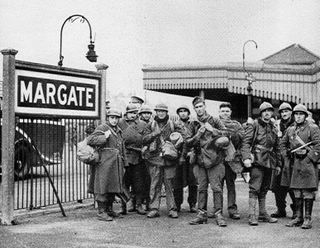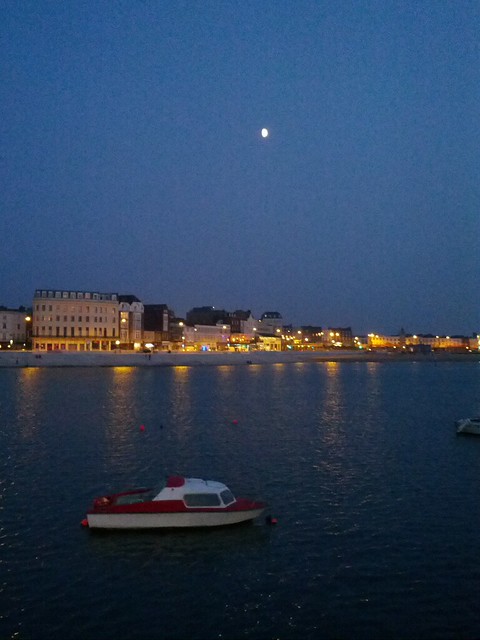Further to my last post, here is another poem by John Betjeman, which I couldn't resist putting up. In the last week, there has been much discussion about the concept of 'Britishness', which we are now supposed to teach. This poem's charming description of old-fashioned seaside holidays in the years between the World Wars as something worth fighting for, seems to fit well with the idea. I also like the subtle emphasis on the family. The location, Margate, is also very apt, as the new Parish Priest of that town seems to be settling in very well, and I am sure he will do great things for the parish.
MARGATE, 1940
From out The Queen's Highcliffe for weeks at a stretch
I watched how the mower evaded the vetch,So that over the putting-course rashes were seen
Of pink and of yellow among the burnt green.
How restful to putt, when the strains of a bandAnnounced a thé dansant was on at The Grand,
While over the privet, comminglingly clear,I heard lesser Co-Optimists down by the pier.How lightly municipal, meltingly tarr'd,
Were the walks through the lawns by the Queen's PromenadeAs soft over Cliftonville languished the light
Down Harold Road, Norfolk Road, into the night.
Oh! then what a pleasure to see the ground floorWith tables for two laid as tables for four,
And bottles of sauce and Kia-Ora and squashAwaiting their owners who'd gone up to wash -Who had gone up to wash the ozone from their skins
The sand from their legs and the rock from their chins,To prepare for an evening of dancing and cards
And forget the sea-breeze on the dry promenades.
From third floor and fourth floor the children looked downUpon ribbons of light in the salt-scented town;
And drowning the trams roared the sound of the seaAs it washed in the shingle the scraps of their tea.
Beside The Queen's Highcliffe now rank grows the vetch,Now dark is the terrace, a storm-battered stretch;
And I think, as the fairy-lit sights I recall,It is those we are fighting for, foremost of all.
While over the privet, comminglingly clear,I heard lesser Co-Optimists down by the pier.How lightly municipal, meltingly tarr'd,
Were the walks through the lawns by the Queen's PromenadeAs soft over Cliftonville languished the light
Down Harold Road, Norfolk Road, into the night.
Oh! then what a pleasure to see the ground floorWith tables for two laid as tables for four,
And bottles of sauce and Kia-Ora and squashAwaiting their owners who'd gone up to wash -Who had gone up to wash the ozone from their skins
The sand from their legs and the rock from their chins,To prepare for an evening of dancing and cards
And forget the sea-breeze on the dry promenades.
From third floor and fourth floor the children looked downUpon ribbons of light in the salt-scented town;
And drowning the trams roared the sound of the seaAs it washed in the shingle the scraps of their tea.
Beside The Queen's Highcliffe now rank grows the vetch,Now dark is the terrace, a storm-battered stretch;
And I think, as the fairy-lit sights I recall,It is those we are fighting for, foremost of all.
Queen's Highcliffe Hotel, Margate
|


No comments:
Post a Comment